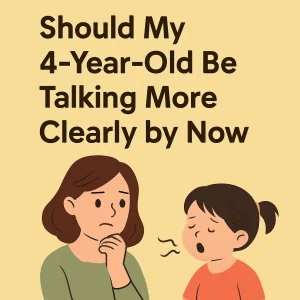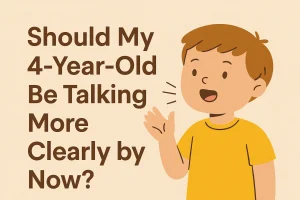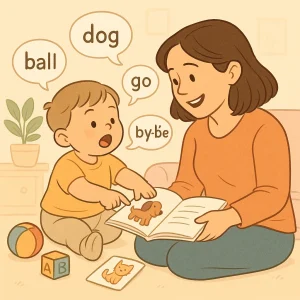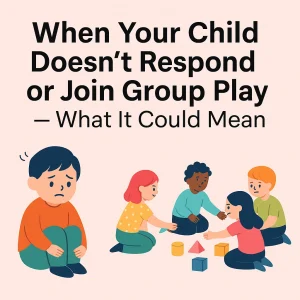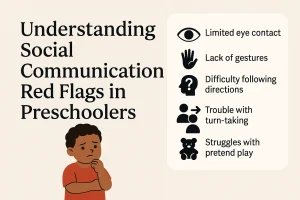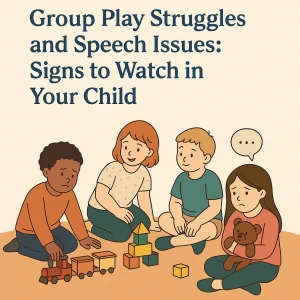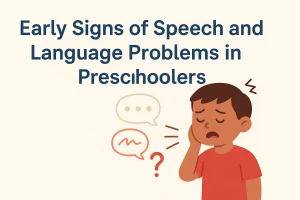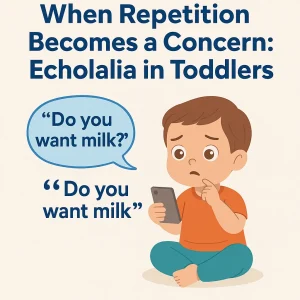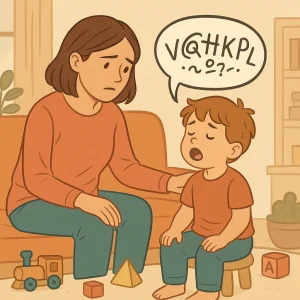Is Your 3–4-Year-Old Hard to Understand? When to Worry
By Rajini D
Last Updated: September 3, 2025
As a parent, it’s natural to feel concerned when your preschooler’s speech isn’t as clear as other kids their age. After all, clear communication is a crucial milestone in their development. But how can you tell if your child’s speech is simply a normal part of growing up, or if it’s a sign of a deeper issue? If you’ve noticed your little one struggling to form words properly or if their speech is difficult to understand, you might be wondering: When should I be concerned about my child’s speech? It’s important to understand that not all speech delays are cause for alarm — many children go through phases where their speech development takes time. However, recognizing the signs of a potential speech delay early on can make all the difference in your child’s long-term progress.
What Does Clear Speech Look Like for Preschoolers?
As a parent, it can be both exciting and concerning when you notice your preschooler’s speech isn’t as clear as you’d expect. The good news is that speech clarity in preschoolers develops gradually over time. Understanding when to expect clear speech and what is considered “normal” can help alleviate worries and guide you in supporting your child’s language development.
1. Typical Speech Milestones for Preschoolers
At the preschool age, which typically ranges from 3 to 5 years, children are rapidly developing their communication skills. By age 3, most children are able to speak in simple sentences, although their speech may still be difficult to understand at times. It’s completely normal for a 3-year-old to mix up sounds or mispronounce words. For instance, they might say “wabbit” instead of “rabbit” or “pasketti” instead of “spaghetti.” These errors are part of the typical developmental process, as their mouth muscles, tongue control, and speech patterns are still maturing.
By age 4, speech clarity begins to improve significantly. Preschoolers at this stage should be able to say most words clearly, although some difficult consonants or multi-syllable words might still pose challenges. It’s common for a 4-year-old to have trouble pronouncing complex sounds like “r” and “s,” but by this age, most children can be understood by family members and familiar adults, even if they still occasionally make errors.
By age 5, most children have mastered the basic sounds of speech and should be able to communicate with greater clarity. At this point, their pronunciation should be near adult-like, with few mispronunciations. While occasional slip-ups still happen (like calling a “truck” a “tuck”), these should be less frequent. Children at this age are able to form more complex sentences, use proper grammar, and engage in conversations with peers and adults alike.
Age-Appropriate Milestones: When Speech Should Be Clearer
It’s important to remember that children develop speech at different rates. However, there are general age-appropriate milestones to consider.
- Age 3, a child’s speech should be mostly intelligible to familiar adults, though they might still struggle with certain sounds.
- Age 4, speech should be clearer to others, with only a few errors on more complex words.
- Age 5, speech should be almost entirely clear, with only minor slips in pronunciation.
The key to understanding typical development timelines is recognizing that speech clarity takes time, and some children may take a little longer than others to reach certain milestones. It’s essential for parents to monitor progress and take note of any concerns, but also to celebrate the small victories, like clearer articulation and longer sentences.
Why Understanding Speech Milestones Matters
Knowing when to expect clearer speech can be reassuring for parents, especially when it comes to understanding what’s “normal” in terms of pronunciation and sentence structure. If your preschooler is progressing through these milestones, then it’s likely that they are developing speech as expected. However, if you notice that your child is consistently having difficulty with speech clarity beyond the typical age range, it may be a good idea to seek advice from a speech-language pathologist (SLP). Early identification of potential speech delays can make a huge difference in a child’s ability to communicate effectively and confidently.
Understanding speech clarity in preschoolers is key to identifying whether your child is simply going through a developmental phase or whether there’s a need for professional support. If in doubt, always consult with a professional who can assess your child’s individual development and offer tailored advice for fostering clear, confident communication.
Common Causes of Unclear Speech in Toddlers
As a parent, it’s completely natural to feel concerned if your toddler’s speech isn’t as clear as you’d expect. Unclear speech in children is quite common, especially in the early years of toddler speech development. But the good news is that in many cases, unclear speech is just part of the developmental journey. Understanding the potential causes behind speech clarity issues can help you determine whether it’s simply a phase or something that may need further attention.
1. Normal Developmental Stages
One of the most common causes of unclear speech in toddlers is simply normal developmental stages. Just like walking and potty training, speech develops at different rates for each child. During the toddler years, children are learning to control their mouth, tongue, and lips to form sounds and words. This can take time and lots of practice.
At around 2 to 3 years old, toddlers may still be mastering basic sounds and may not yet have the coordination to pronounce all words clearly. It’s common for them to mix up sounds, leave out syllables, or use simpler alternatives for complex words. For example, a child might say “ba” instead of “ball,” or “car” instead of “truck.” These are normal speech development errors and typically improve as children grow.
By age 4, most toddlers begin to speak more clearly, but there will still be some occasional mispronunciations or difficulty with complex sounds. For instance, they might say “wabbit” for “rabbit” or have trouble pronouncing the “r” sound correctly. These small errors are typical and often resolve as the child matures.
2. Hearing Problems
Another potential cause of unclear speech in children could be hearing issues. If a toddler has difficulty hearing, they may not be able to accurately reproduce the sounds they are trying to say. This is why it’s essential to ensure your child’s hearing is tested regularly, particularly if you notice speech delays or unclear pronunciation.
Hearing problems can range from temporary conditions like ear infections (which can affect hearing ability) to more persistent issues such as hearing loss. If a toddler’s hearing is impaired, they may not hear certain sounds clearly, which can directly impact how they learn to speak and form words.
If you suspect that hearing issues may be affecting your child’s speech, it’s important to consult with a pediatrician or audiologist for a hearing assessment. Addressing any hearing issues early on can prevent further speech delays or clarity problems.
3. Developmental Delays
In some cases, unclear speech in toddlers may be linked to developmental delays. This can refer to broader delays in a child’s overall development, including speech, language, motor skills, or social behavior. Some toddlers may experience delays in language development, which can make it difficult for them to form clear speech patterns.
A speech delay is when a toddler has difficulty developing language skills at the typical age. For example, they may not be speaking as many words as their peers, or their speech may be unclear because they haven’t yet mastered the sounds needed to form words. Language delays may also occur alongside speech delays, and these can affect both understanding and expression. A child with a language delay might not understand what is being said to them or may have trouble putting words together to form sentences.
It’s important to note that speech delay and language delay are different but can often overlap. Speech delay specifically refers to difficulties with the sounds, pronunciation, and articulation of speech. Language delay, on the other hand, refers to delays in vocabulary, sentence structure, or the ability to use language appropriately.
4. Language Delay vs. Speech Delay: Understanding the Difference
While both language delay and speech delay can cause unclear speech, it’s important to differentiate between the two to understand the underlying issues. Speech delay focuses on how words are pronounced, and it can often resolve with time and practice. Language delay, however, involves more than just pronunciation—it also affects the child’s ability to form sentences, understand words, and use language effectively.
A toddler with a language delay might have a limited vocabulary or struggle to understand simple commands. On the other hand, a child with a speech delay might use an adequate vocabulary but mispronounce words or have trouble making their speech understandable.
Understanding the root cause of unclear speech in toddlers is key to providing the right support. If the issue seems to be related to a developmental delay or hearing problem, early intervention from a pediatrician, speech-language pathologist, or other specialists can make a huge difference in helping your toddler improve their speech clarity.
5. Other Factors That Can Affect Speech Clarity
There are other less common factors that can contribute to unclear speech in toddlers. These include things like oral motor issues, where the child’s mouth and tongue muscles don’t work as efficiently as they should, or even psychological factors, like anxiety or social stress, which can impact a child’s willingness to speak clearly.
However, for most toddlers, unclear speech is simply a phase that resolves as they grow and develop. Still, it’s essential to monitor your child’s speech development and consult with a professional if you notice persistent or concerning delays.
When Should You Be Concerned? Key Signs of Speech Delay
As parents, it’s only natural to worry if your preschooler’s speech doesn’t seem to be developing as quickly as other children their age.
It’s a question that many parents find themselves asking when they notice that their child’s speech is unclear or lagging behind developmental milestones. While some delays in speech development are completely normal, there are certain signs that could indicate a need for professional evaluation.
What are the signs of speech delay in a toddler?
Key Signs of Speech Delay in Preschoolers
Every child develops speech and language skills at their own pace, but there are general delayed speech milestones that most children hit around certain ages. If your preschooler is not meeting these milestones, it may be a sign that they are experiencing a speech delay.
- Limited Vocabulary
By age 2, most children have a vocabulary of around 50 words. By age 3, this should grow to around 200–1,000 words. If your preschooler’s vocabulary is limited and they are not adding new words regularly, it could be a speech delay. - Difficulty Putting Words Together
By age 3, children typically start putting two to three words together to form simple sentences (e.g., “I want cookie” or “Mommy help me”). If your child is still using single words or is unable to string together two or more words to communicate by age 3, this could be an indication of a language delay or speech delay. - Inability to Be Understood by Others
As your child’s speech develops, their pronunciation improves, and they become easier to understand. By age 3 to 4, your preschooler’s speech should be understandable to familiar adults, even if they make occasional errors with certain sounds. If your child’s speech remains unclear and is hard for others, including family members, to understand, it could point to preschooler speech problems that need attention. - Not Following Simple Instructions
By age 2 or 3, most children can follow simple instructions like “Give me the ball” or “Come here.” If your preschooler struggles to understand or follow simple commands, this may indicate an issue with receptive language skills, which can impact speech development. - Limited Social Communication
If your child avoids or shows little interest in using language for social interaction—such as not asking questions, not using gestures like pointing, or not engaging in simple conversation with family members—this may be a sign of delayed speech and social development.
The Difference Between Simple Speech Delay and More Serious Issues
It’s important to recognize that not all speech delays are the same. While some delays are developmental and resolve with time, others can be linked to more serious issues. Understanding the difference between a simple speech delay and more complex speech disorders or articulation problems can help guide you toward the right steps to take.
- Speech Delay vs. Speech Disorder
A speech delay typically means that a child is simply lagging behind their peers in terms of speech development. They might not yet be speaking as clearly or using as many words as other children their age, but their language skills are developing, just at a slower pace. A speech disorder, however, involves a more persistent problem where the child struggles with the mechanics of speech. This could include articulation issues, such as not being able to say certain sounds correctly, or more complex conditions like stuttering or difficulty making words flow properly. - Articulation Problems
If your preschooler has difficulty pronouncing sounds or words correctly, they may be dealing with an articulation disorder. This is more than just typical mispronunciations or mixing up words. For example, a child with an articulation problem may consistently have difficulty pronouncing certain letters or sounds (like “r” or “s”) beyond the age when most children have mastered them. - Other Developmental Concerns
Sometimes, a speech delay is just one symptom of a broader developmental issue, such as autism spectrum disorder (ASD) or intellectual disabilities. Children with autism may experience speech delays, often along with other behavioral or social difficulties. If your child is exhibiting signs of speech delay along with other developmental concerns, such as difficulty with social interactions, lack of eye contact, or repetitive behaviors, it’s important to seek an evaluation from a specialist.
When Should You Seek Professional Help?
If your preschooler exhibits any of the above signs, especially beyond the typical delayed speech milestones, it may be time to consult a professional. A speech-language pathologist (SLP) can evaluate your child’s speech and language development to determine if there is a speech delay or if there are other underlying concerns that need to be addressed.
Early intervention is crucial in addressing preschooler speech problems. The earlier you identify and address speech delays, the more likely your child is to catch up to their peers and thrive in their communication skills. An SLP will work with your child to develop tailored strategies and exercises to improve speech clarity and language skills.
Milestones to Watch: Is Your Preschooler’s Speech Delayed?
As a parent, it’s natural to want to keep track of your child’s development and celebrate each milestone they reach. Speech development is one of the most significant aspects of early childhood growth. But how do you know when your preschooler’s speech is on track, and when it might be time to be concerned about a possible toddler speech delay? Understanding key toddler speech delay symptoms and signs can help you better monitor your child’s progress and know when to seek professional guidance.
Let’s break down the milestones to watch and provide a timeline of expected speech development for preschoolers. By knowing what to expect at different stages, you’ll feel more confident in supporting your child’s speech clarity as they grow.
1. Age 2: Beginning to Build Vocabulary
At around age 2, toddlers are just starting to expand their vocabulary and may use 50 or more words. While their speech may still be unclear or hard to understand, this is the time when they start using words to communicate more effectively.
- What to Expect:
- A vocabulary of about 50 words
- Use of simple two-word phrases (e.g., “want cookie” or “big truck”)
- Struggling to pronounce some words correctly, but generally using words to express needs
- Difficulty being understood by strangers, but family members may understand them more easily
- When to worry about toddler speech delay: If your child has fewer than 50 words by age 2 or isn’t attempting to combine words by 2.5 years, it could be a sign of toddler speech delay symptoms and signs.
2. Age 3: Forming Simple Sentences and Expanding Vocabulary
By age 3, your toddler should be able to string words together into simple sentences and have a vocabulary of about 200–1,000 words. This is an exciting time as children start to express themselves more clearly and engage in short conversations.
- What to Expect:
- Use of 3- to 4-word sentences (e.g., “I want my toy” or “Mom, look at me”)
- Vocabulary growth with more nouns, verbs, and adjectives
- Increased clarity in speech, though some sounds might still be mispronounced (e.g., “wabbit” for “rabbit” or “pasketti” for “spaghetti”)
- Understanding of basic questions like “What’s your name?” and “Where is the ball?”
- When to worry about toddler speech delay: If your child struggles to form sentences or has a vocabulary significantly below the expected range (less than 100 words) by age 3, this may be a sign of speech delay.
3. Age 4: Improved Pronunciation and Complex Sentences
By age 4, your preschooler’s speech should become much clearer, with improved pronunciation. At this age, they will start using longer sentences and may even begin to use basic grammar correctly, such as plurals, past tense, and possessive forms.
- What to Expect:
- A vocabulary of 1,000 words or more
- Ability to form complex sentences (e.g., “I don’t like that toy because it’s too loud”)
- Speech should be mostly understandable to strangers, with only occasional errors on complex words
- Understanding of basic story concepts (e.g., beginning, middle, and end) and ability to follow multi-step directions
- Ability to answer questions like “What do you like to do?” or “How are you feeling?”
- When to worry about toddler speech delay: If your child still struggles to be understood by unfamiliar adults or cannot speak in full sentences by age 4, this could indicate a more significant speech delay or a potential speech disorder.
4. Age 5: Near Adult-like Speech
By age 5, most children’s speech should be almost entirely clear, and they should have mastered most of the sounds and complex words. At this stage, preschoolers begin using more sophisticated language and are able to have conversations with both peers and adults.
- What to Expect:
- A rich vocabulary of 2,000+ words
- Ability to speak in full, grammatically correct sentences (e.g., “I went to the park with my friend and we played on the swings”)
- Understanding and using basic abstract concepts (e.g., “How does it feel to be sad?”)
- Almost all speech should be understandable to people outside the family, with minimal mispronunciations
- Ability to tell stories, explain their thoughts, and engage in group conversations
- When to worry about toddler speech delay: If your child is still significantly unintelligible or struggles with sentence structure by age 5, it may indicate a more serious speech disorder or other underlying developmental concerns.
When to Seek Help: Consult a Speech-Language Pathologist (SLP)
As a parent, it’s natural to feel concerned when your preschooler’s speech isn’t progressing as expected. You may be wondering: When should I seek professional help for my child’s unclear speech? While some speech delays are a normal part of development, there are instances when it’s important to consult a speech-language pathologist for toddlers (SLP). Knowing when to seek help can make all the difference in your child’s speech development and ensure they get the right support at the right time.
When Should You Consider Consulting an SLP?
If your child is showing signs of speech delay or language difficulties, an SLP can provide invaluable support. Here are a few key situations when you should consider consulting a speech-language pathologist:
- Speech Isn’t Improving Over Time
If your toddler’s speech is not improving as they get older, it may be time to seek help. For example, by age 2, most children should have at least 50 words in their vocabulary and begin combining two words into simple phrases. If your child is not meeting these milestones or their speech is not becoming clearer as they approach age 3 or 4, it could be a sign of a more significant speech or language issue. - Difficulty Being Understood by Others
By age 3, your toddler’s speech should be mostly understandable to familiar adults, even if they make occasional errors. If your child’s speech remains unclear beyond this age and is difficult for family, friends, or even teachers to understand, this could be an indication of preschooler speech problems that require professional assessment. - Limited Vocabulary or Difficulty Forming Sentences
A typical speech milestone for a 3-year-old is the ability to use at least a few three-word sentences, such as “I want juice” or “Mommy help me.” If your child is still only using single words or cannot form simple sentences by age 3, they may benefit from an evaluation by an SLP to determine if there is a language delay or speech delay. - Not Using Speech for Social Interaction
Communication is not just about speaking clearly but also about using speech for social interaction. If your child is not showing interest in social communication, such as making eye contact, asking questions, or responding to others in conversation, it might be worth consulting a professional. Language delays can sometimes overlap with other developmental challenges, like autism, and early intervention is key. - Other Developmental Concerns
If your child is also showing delays in other areas of development, such as motor skills, cognitive abilities, or social behavior, it’s a good idea to get a full evaluation from an SLP. Sometimes, speech delays are just one part of a broader developmental issue. For instance, children with autism spectrum disorder (ASD) often experience speech and language delays, along with challenges in social communication. A speech-language pathologist can help pinpoint whether speech delays are linked to other developmental concerns.
How Can an SLP Help Evaluate Speech Clarity and Diagnose Speech or Language Disorders?
A speech-language pathologist for toddlers is a trained professional who specializes in diagnosing and treating speech and language disorders. Here’s how an SLP can help your child:
- Comprehensive Assessment
When you consult an SLP, they will start by conducting a thorough assessment to evaluate your child’s speech and language development. This assessment may include standardized tests, observations of your child’s communication skills in different settings, and discussions with you about their developmental history. The SLP will also assess your child’s ability to understand language, form sentences, and pronounce words correctly. - Identifying Speech or Language Delays
Based on the results of the assessment, the SLP can determine if your child is experiencing a speech delay or language delay. If the child is struggling with articulation (pronunciation), they may have an articulation disorder. If they are having difficulty understanding language or using words to communicate, the SLP may diagnose a language disorder. The SLP will then outline a plan for intervention based on the specific needs of your child. - Creating a Personalized Therapy Plan
If a speech or language disorder is diagnosed, the SLP will develop a tailored therapy plan to help your child improve their speech clarity, language skills, and communication abilities. This might include exercises to strengthen the muscles used in speech, activities to improve vocabulary, and strategies for helping the child construct more complex sentences. - Parent Involvement and Education
SLPs often work closely with parents to ensure that therapy is effective and progress is being made. The therapist will teach you strategies and techniques to support your child’s communication at home. This can include simple activities, such as reading together, practicing sounds, or encouraging your child to use new words in everyday conversations. By involving parents in the process, the SLP ensures that improvements continue outside of therapy sessions. - Early Intervention for Better Outcomes
One of the most significant benefits of seeing an SLP early is that intervention tends to be more effective the younger the child is. Early speech therapy can prevent further delays in language development, which can affect academic performance and social interactions in the future. The sooner speech issues are identified, the sooner your child can begin to work on improving their communication skills.
How to Support Your Preschooler’s Speech Development at Home
Supporting your preschooler’s speech development at home is one of the most effective ways to ensure they build strong communication skills. While speech therapy for toddlers can play a key role in addressing any delays or issues, there are plenty of things you can do at home to help your child thrive in their early childhood speech development. By incorporating simple, everyday activities into your routine, you can create an environment that fosters language growth and builds confidence in your child’s ability to communicate.
Here are some actionable tips to support your preschooler’s speech development at home:
1. Read Together Every Day
One of the most important activities you can do to support early childhood speech development is to read to your child regularly. Reading not only introduces new vocabulary but also helps with sentence structure, comprehension, and understanding of language.
- What to do: Choose age-appropriate books with colorful pictures and simple stories. As you read, point to the pictures and name objects, actions, and feelings. Ask questions about the story, like “What do you think happens next?” or “How do you think the character feels?”
- Why it works: This activity helps build your child’s vocabulary, improves their listening skills, and enhances their ability to understand and process language.
2. Use Speech Apps and Interactive Tools
With today’s technology, there are numerous speech apps for toddlers that can help reinforce speech development in a fun and engaging way. These apps are often designed to target specific language skills, from vocabulary building to pronunciation practice.
- What to do: Look for interactive apps that focus on language therapy for toddlers. Many apps offer games that teach children how to pronounce sounds, match words with pictures, or practice building sentences.
- Why it works: These tools can be a great supplement to in-person speech therapy and allow children to practice language skills in a low-pressure, enjoyable environment.
3. Play Language-Building Games
Playing games is an excellent way to foster speech development while having fun. Whether it’s through board games, word games, or simple everyday activities, games are a natural way to encourage communication and creativity.
- What to do: Try games like “Simon Says,” “I Spy,” or “20 Questions” to help your child build their vocabulary and improve sentence construction. You can also use toys like dolls, action figures, or stuffed animals to create stories and role-play scenarios together.
- Why it works: These games engage your child in conversation, encourage them to think creatively, and give them the opportunity to practice new words and phrases in context.
4. Model Clear Speech
Preschoolers learn by imitating those around them, so it’s essential to model clear, correct speech. When talking to your child, make sure you speak slowly and clearly, pronouncing words properly so your child can mimic them.
- What to do: If your child mispronounces a word, gently repeat it correctly without making them feel self-conscious. For example, if your child says “wabbit” for “rabbit,” say “Yes, that’s a rabbit!” and continue the conversation.
- Why it works: Modeling correct pronunciation helps your child learn the proper way to say words and gives them the tools they need to improve their own speech.
5. Encourage Conversations
Children learn language best through interaction. Encourage your preschooler to talk by asking open-ended questions that require more than a yes or no answer. Give them time to think and respond, and show interest in their thoughts.
- What to do: Ask questions like “What did you do today?” or “Can you tell me about your favorite toy?” Avoid interrupting or finishing their sentences for them, as this can hinder their ability to express themselves.
- Why it works: Giving your child the space and encouragement to speak helps build their confidence and promotes more complex language use.
6. Sing Songs and Rhymes
Singing songs and nursery rhymes is not only fun but also beneficial for speech development. The rhythm and repetition of songs help children learn the sounds and patterns of language.
- What to do: Sing simple songs with your child, such as “Twinkle, Twinkle Little Star” or “The Wheels on the Bus.” Encourage them to join in by singing along or acting out the movements.
- Why it works: Rhymes and songs help with memory, vocabulary, and pronunciation. The repetitive nature of rhymes makes it easier for your child to remember and practice new words.
7. Provide Opportunities for Play and Social Interaction
Peer interactions play a crucial role in language development. Provide opportunities for your child to play with other children, whether it’s at a park, playdate, or in a group setting.
- What to do: Arrange playdates with other children in your neighborhood, or encourage group activities where children can interact and communicate.
- Why it works: Social interactions help children learn conversational skills, practice taking turns, and use language in a variety of contexts. Playing with others encourages communication in a natural, enjoyable setting.
8. Use Visual Aids to Enhance Understanding
Some children find it easier to understand and learn new words when they can see pictures or objects associated with them. Visual aids can help strengthen their connection between words and their meanings.
- What to do: Use flashcards, picture books, or everyday objects to introduce new vocabulary. For example, when teaching your child the word “dog,” show them a picture or a toy dog to reinforce the word’s meaning.
- Why it works: Visual aids provide a concrete reference, making it easier for children to understand abstract concepts and remember new vocabulary.
9. Create a Routine and Encourage Predictable Language
Establishing routines helps children feel more secure and understand language in context. When children know what to expect, they can begin to associate words with specific actions and events.
- What to do: Use consistent phrases for everyday activities like “It’s time to eat,” “Let’s put on your shoes,” or “Please pick up your toys.”
- Why it works: Predictable language in routine activities helps children understand the purpose of language and the expectations of communication.
Speech Delay vs. Late Talker: What’s the Difference?
As a parent, it can be both confusing and concerning when your child’s speech development doesn’t seem to match up with that of their peers. You might be wondering: Is it normal for a 3-year-old to speak unclearly? Or, perhaps you’re concerned that your 4-year-old is not speaking as clearly as expected, and you’re asking yourself whether it’s a speech delay in 4-year-olds or just a phase.
Understanding the difference between a late talker and a child with a speech delay can help you make informed decisions about whether your child’s development is typical or whether additional support might be necessary. Let’s break down the key differences and help you identify whether your child might need therapy or whether they are simply a late talker.
What is a Late Talker?
A late talker is a child who speaks later than their peers but eventually catches up in terms of language development. Typically, late talkers will start talking later than other children but show no other signs of developmental delay. They may not use as many words as other kids their age, but once they do start speaking, their vocabulary and sentence structure quickly improve.
- Key Traits of Late Talkers:
- Normal development overall: Late talkers tend to meet other developmental milestones like walking, socializing, and playing appropriately.
- Gradual increase in vocabulary: These children may have a smaller vocabulary at first, but once they begin speaking, their word bank rapidly grows.
- Communication through gestures and non-verbal cues: Before they start speaking, late talkers often communicate with gestures, pointing, and other non-verbal cues.
- Catch up with age peers: By age 3 or 4, late talkers usually catch up with their peers in terms of both speech clarity and vocabulary.
While being a late talker can be frustrating for both parents and children, it’s usually nothing to worry about. Late talkers typically develop speech and language skills within the expected timeline, just a bit later than their peers.
What is a Speech Delay?
A speech delay, on the other hand, refers to a situation where a child’s speech and language development is significantly behind where it should be for their age. Children with speech delays may show signs that indicate they are not developing their speech and language skills as expected, and they may need additional support, such as speech therapy.
- Key Traits of Speech Delays:
- Delayed milestones: Children with speech delays may miss important language milestones, like speaking their first words by 12 to 18 months or combining two words by 2 years old.
- Difficulty forming sentences: While late talkers may start forming sentences later, children with speech delays might struggle to put sentences together even after their peers have started using more complex language.
- Limited vocabulary: A child with a speech delay in 4-year-olds, for example, may have a significantly smaller vocabulary compared to their peers.
- Pronunciation issues: Children with speech delays might have difficulty articulating words correctly, and their speech may remain unclear even as they approach age 4 or 5.
- Potential underlying issues: Speech delays may sometimes be linked to other developmental concerns, such as hearing problems, cognitive delays, or disorders like apraxia of speech.
How to Identify Whether Your Child is a Late Talker or Has a Speech Delay
The primary difference between a late talker and a child with a speech delay lies in the trajectory of speech development. Late talkers typically catch up without much intervention, while children with speech delays often require speech therapy to help them reach age-appropriate communication milestones. Here’s how to tell which category your child might fall into:
- Watch for Milestone Delays:
- Late Talker: A child who is a late talker might not start speaking as early as other children, but they’ll begin forming words and sentences soon after. They generally don’t show other signs of developmental delays.
- Speech Delay: A child with a speech delay may not meet basic speech milestones, such as speaking by age 1 or using two-word phrases by age 2. Speech delay in 4-year-olds is a common concern, and by this age, children should generally be using short sentences and be understood by familiar adults.
- Assess Overall Development:
- Late Talker: These children typically develop other skills (walking, socializing, and playing) at an age-appropriate rate. They may be quieter but still engaged in activities and social interactions.
- Speech Delay: Children with speech delays may also show delays in other areas, such as motor skills or cognitive abilities. They may struggle with social interactions or show frustration due to their difficulty expressing themselves.
- Consider Speech Clarity:
- Late Talker: Once a late talker begins speaking, their speech typically becomes clearer over time. While there may be some early mispronunciations, their clarity improves quickly.
- Speech Delay: A child with a speech delay may struggle with clarity even as they get older. Their speech may remain unclear beyond age 4, and they might consistently mispronounce words, making it harder for others to understand them.
- Consider Other Communication Behaviors:
- Late Talker: These children tend to use gestures, pointing, or other non-verbal cues to communicate before they start speaking. They are often still able to understand language and follow simple instructions.
- Speech Delay: A child with a speech delay might have difficulty understanding spoken language or following instructions. They may also avoid trying to communicate, either because of frustration or because they haven’t yet developed the skills to do so effectively.
When Should You Be Concerned About a Preschooler’s Speech?
As a parent, it’s natural to feel a bit anxious if your preschooler’s speech doesn’t seem to be progressing as expected. You might be wondering: When should I be concerned about my child’s speech?
Understanding when a speech issue is typical for their age and when it might require professional attention can be tricky. Early intervention is key to helping your child develop clear communication skills, so it’s important to know the signs that should prompt you to seek professional help.
Let’s break down the signs to watch for and provide you with a helpful checklist to evaluate your preschooler’s speech development.
Signs That Should Prompt You to Seek Professional Help
While each child develops at their own pace, there are certain signs that indicate it may be time to consult a speech-language pathologist (SLP). Here are the key indicators that should raise concern about your child’s speech development:
- Limited Vocabulary for Their Age
By age 2, most children should have around 50 words in their vocabulary, and by age 3, their vocabulary should be expanding significantly. If your child has a very limited vocabulary and isn’t adding new words as they get older, it may be a sign of a speech delay. - Difficulty Putting Words Together
By age 3, children should begin forming simple sentences, like “I want cookie” or “Mommy help me.” If your child struggles to combine two or more words by age 3, this could be a speech delay. - Speech That’s Hard to Understand
By age 3 or 4, most preschoolers can be understood by familiar adults, even if they make occasional errors. If your child’s speech is still unclear at age 4 and they’re difficult to understand by family or teachers, it could indicate a more serious speech issue. - Not Following Simple Instructions
By age 2 or 3, most children should be able to follow simple directions like “Give me the ball” or “Come here.” If your child consistently struggles to understand basic instructions, it could point to a language delay. - Limited Social Communication
If your child avoids talking to others, doesn’t show interest in engaging with peers, or has trouble using language to express themselves socially, this may be an indication of a language disorder. Healthy social communication is essential for speech development, and a lack of interaction could signal a delay. - Frustration or Avoidance
If your child seems frustrated or avoids communicating altogether, it may be a sign that they’re struggling with speech and language development. This can include avoiding talking or using gestures rather than words to communicate. - Delayed Milestones in Other Areas
Speech delays can sometimes be linked to broader developmental delays. If your child is also showing delays in motor skills, social behavior, or cognitive abilities, this could indicate a developmental concern that requires professional evaluation.
Checklist for Evaluating Your Preschooler’s Speech Development
Here’s a simple checklist to help you assess your child’s speech development. Use this to monitor progress and identify areas where your child may need extra support:
- At Age 2:
- Does your child use at least 50 words?
- Can your child combine two words together (e.g., “want cookie” or “big truck”)?
- Does your child try to communicate with gestures or pointing if they don’t have the words?
- Can your child follow simple commands like “Give me the toy” or “Come here”?
- At Age 3:
- Is your child using at least 200 words and combining three or more words in sentences?
- Can your child be understood by family members and familiar adults, even with some mispronunciations?
- Does your child respond to simple questions like “What’s your name?” or “Where’s your toy?”
- Is your child able to follow two-step instructions, such as “Pick up the ball and put it in the basket”?
- At Age 4:
- Is your child using clear, mostly understandable speech with minimal mispronunciations?
- Can your child express their thoughts and feelings with full sentences and correct grammar?
- Is your child actively engaging in conversations with others, asking questions, and telling simple stories?
- Does your child understand and use prepositions (like “under,” “on,” and “next to”) correctly?
Early Intervention: How Early Speech Therapy Can Help
When it comes to speech development in preschoolers, timing is everything. Early intervention is one of the most effective ways to address speech delays and other communication challenges. If you’re wondering whether to seek professional help for your child’s speech concerns, it’s important to understand just how much of a difference early speech therapy can make. Early intervention for speech delay can significantly improve your child’s ability to communicate and can lead to lasting benefits that extend far beyond just speech.
Why Early Speech Therapy Matters
When a preschooler is struggling with speech clarity, it’s tempting to think that they’ll simply “grow out of it.” However, the truth is that speech delays often don’t resolve on their own, and without the right intervention, children may face continued difficulties in their communication and social interactions.
The earlier the intervention, the better. Speech therapists work with young children to assess their specific needs and provide targeted strategies that promote effective speech and language development. The early years of a child’s life are a critical time for brain development, and addressing speech issues during this period can have a profound impact on a child’s ability to succeed academically and socially later in life.
The Benefits of Early Speech Therapy
1. Prevents Future Speech Problems:
Early speech therapy focuses on identifying and addressing speech delays before they become more serious challenges. By working on issues like articulation, vocabulary, and sentence structure early, children are less likely to experience difficulties in school and beyond. Early intervention can help prevent issues from compounding over time, allowing the child to develop communication skills in a more natural and confident way.
2. Improves Academic Performance:
Speech is integral to academic success. A child who has difficulty communicating may struggle with following directions, expressing ideas, or participating in classroom discussions. Early intervention for speech delay helps children build foundational communication skills, which in turn supports their learning and academic performance. Clear communication is crucial for understanding instructions, answering questions, and engaging with peers and teachers.
3. Boosts Social and Emotional Development:
Speech delays can sometimes make children feel frustrated or isolated, especially if they have difficulty expressing themselves. Early speech therapy can help children gain confidence in their communication abilities, reducing the frustration that comes from not being understood. As children’s communication improves, their social interactions also become easier, allowing them to form stronger relationships with family, friends, and peers.
4. Strengthens Cognitive Skills:
Speech and language development are closely linked to cognitive growth. When children receive early therapy, they not only improve their verbal communication skills but also strengthen their thinking and problem-solving abilities. Therapy helps them connect words with meaning, understand concepts like cause and effect, and improve memory—all of which contribute to overall cognitive development.
5. Tailored Strategies for Success:
One of the greatest advantages of early speech therapy is that it’s tailored to each child’s unique needs. An experienced speech-language pathologist (SLP) will create a personalized therapy plan that focuses on the specific areas where your child is struggling, whether it’s articulation, language comprehension, or social communication. With this targeted approach, children can make faster and more sustained progress.
Research: The Positive Effects of Early Intervention
Numerous studies and real-life case studies demonstrate the lasting benefits of early speech therapy:
- The Long-Term Impact of Early Therapy
Research published in the Journal of Speech, Language, and Hearing Research found that children who received early intervention for speech delays showed significant improvements in communication skills by the age of 5. These children were not only more successful in school but also had better social and emotional outcomes. The study concluded that early intervention helps children develop more advanced language skills, allowing them to engage more effectively with their peers and teachers. - Supporting Research on Early Intervention
A study conducted by the American Speech-Language-Hearing Association (ASHA) showed that children who received early intervention for speech delay were more likely to demonstrate advanced language development by the time they entered kindergarten. These children not only showed improvements in speech clarity but also in reading and writing skills, which are closely tied to early language development. The research reinforces the idea that the earlier speech challenges are addressed, the more likely children are to achieve academic success later in life.
When to Seek Early Intervention for Your Child
It’s never too early to seek professional help if you’re concerned about your child’s speech development. Signs that may indicate the need for early intervention include:
- Limited vocabulary by age 2
- Difficulty combining words into sentences by age 3
- Speech that is not understood by family members by age 3
- Difficulty following simple directions or engaging in conversations
- Frustration or avoidance of communication
If you notice any of these signs, consulting a speech-language pathologist can provide clarity and guidance on how to support your child’s speech development.
Conclusion
Understanding your preschooler’s speech milestones is key to supporting their development. If your child’s speech isn’t progressing as expected, it’s important to know when to seek help. If you notice unclear speech or difficulty forming sentences, don’t wait—consult a speech-language pathologist. Early intervention can make a huge difference, helping your child improve their speech and confidence. What to do when your preschooler’s speech isn’t clear? Seek professional help right away. With the right support, most children can catch up and develop strong communication skills. Monitoring their progress ensures they’re on the path to success!
Frequently Asked Questions:
1. What are the signs of speech delay in a preschooler?
If your preschooler is struggling with unclear speech, they may have a speech delay. Key signs include difficulty combining words into sentences, a limited vocabulary for their age, and speech that’s hard to understand by age 3 or 4.
2. Is it normal for a 3-year-old to speak unclearly?
Yes, it’s common for a 3-year-old to still have some unclear speech. They may make errors with sounds or pronunciation. However, if they are hard to understand by others or aren’t progressing in speech by age 4, it might be time to seek help.
3. When should I be concerned about my child’s speech?
If your child isn’t meeting typical speech milestones by age 3, such as forming sentences or using a vocabulary of 200-1,000 words, it’s a good idea to consult with a speech-language pathologist (SLP) to evaluate their speech development.
4. How can I help my child improve their speech at home?
You can support your child’s speech by reading to them regularly, playing language-building games, encouraging conversations, and using speech apps. Consistent practice and encouragement will help improve clarity and vocabulary.
5. What are the common causes of unclear speech in toddlers?
Unclear speech in toddlers can be due to normal developmental stages, hearing issues, or developmental delays. If your toddler’s speech isn’t improving as expected, it’s important to monitor their progress and consult a professional if needed.
6. What is the difference between a late talker and a child with a speech delay?
A late talker starts speaking later than their peers but eventually catches up. A child with a speech delay may have more persistent issues with speech and language development and may require speech therapy to catch up.
7. Should I be concerned if my child isn’t speaking in full sentences by age 3?
If your child isn’t forming sentences by age 3, this could be a sign of speech delay. It’s important to seek help from a speech-language pathologist to assess your child’s communication skills.
8. How can speech therapy help my preschooler?
Speech therapy can help your preschooler improve speech clarity, vocabulary, and sentence formation. A speech-language pathologist will tailor therapy to your child’s specific needs, helping them catch up with their peers.
9. What are typical speech milestones for a 4-year-old?
By age 4, children should be able to speak clearly with a vocabulary of around 1,000 words. They should also form complex sentences and engage in basic conversations. If this isn’t happening, consider seeking professional help.
10. When is the best time to seek professional help for my child’s speech?
If your child is consistently behind in speech milestones or has difficulty being understood by others, it’s a good idea to consult a speech-language pathologist. Early intervention can make a big difference in improving speech clarity and communication skills.
About the Author:
Rajini is a passionate and dedicated Speech-Language Pathologist with over 9+ years of experience, specializing in both developmental speech and language disorders in children and rehabilitation in adults. Driven by a desire to empower each individual to find their voice, Rajini brings a wealth of experience and a warm, genuine approach to therapy. Currently, at Wellness Hub, she thrives in a team environment that values innovation, compassion, and achieving results for their clients. Connect with Rajini to learn more about how she can help you or your loved one find their voice
Book your Free Consultation Today
Parent/Caregiver Info:
Client’s Details:
* Error Message
